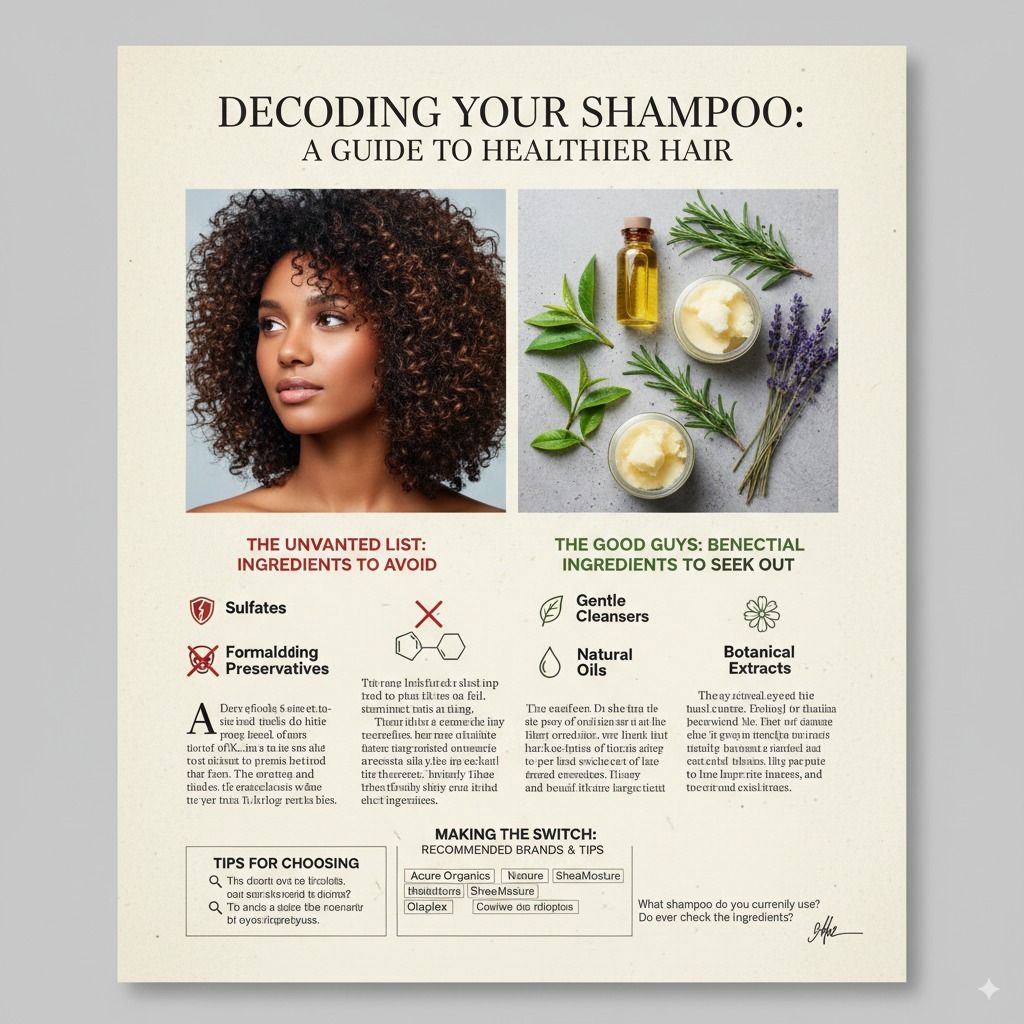- Ark's Newsletter
- Posts
- Decoding Your Shampoo: A Guide to Healthier Hair
Decoding Your Shampoo: A Guide to Healthier Hair
Decoding Your Shampoo: A Guide to Healthier Hair

In today’s beauty landscape, a growing number of consumers are scrutinizing what goes into their personal care products. When it comes to shampoo, the desire for formulations free from harsh chemicals isn’t just a trend—it’s a move towards genuinely healthier hair and scalp. But with countless options lining the shelves, how do you navigate the ingredient maze? This guide will demystify common shampoo additives, highlighting what to avoid and what to embrace for luscious, vibrant hair.
The Unwanted List: Ingredients to Avoid
Not all ingredients are created equal, and some common shampoo components can do more harm than good. Understanding these can empower you to make informed choices.
Sulfates (SLS, SLES): These powerful detergents are responsible for that rich lather we often associate with “clean.” However, they’re notorious for stripping natural oils from your hair and scalp, leading to dryness, irritation, and even fading your hair color.
Parabens (e.g., methylparaben, propylparaben): Used as preservatives, parabens have sparked health concerns due to their potential to disrupt hormones.
Phthalates (e.g., DEP, DBP): Often hidden within “fragrance” labels, phthalates are endocrine disruptors linked to various health issues, including reproductive concerns.
Synthetic Fragrances/Perfumes: These proprietary blends can contain hundreds of unlisted chemicals, including phthalates, triggering allergic reactions, headaches, and respiratory problems. Opt for “fragrance-free” or essential oil-scented products.
Formaldehyde-Releasing Preservatives (e.g., DMDM hydantoin): These slowly release formaldehyde, a known carcinogen and allergen.
Silicones (e.g., dimethicone): While not directly harmful, non-water-soluble silicones can build up on hair, causing dullness, weighing it down, and preventing essential moisture from penetrating. Seek out water-soluble silicones or, ideally, silicone-free alternatives.
Coal Tar: A known human carcinogen sometimes found in dandruff shampoos.
Triclosan: An antibacterial agent that can disrupt thyroid function and contribute to antibiotic resistance.
PEGs (Polyethylene Glycols): These can be contaminated with 1,4-dioxane, a probable human carcinogen, during manufacturing.
The Good Guys: Beneficial Ingredients to Seek Out
Thankfully, nature and responsible science offer a wealth of ingredients that genuinely nourish and protect your hair.
Gentle Cleansers: Look for plant-derived cleansers like coco-glucoside, decyl glucoside, or sodium cocoyl isethionate, which effectively clean without stripping.
Natural Oils & Butters: Argan, jojoba, coconut oil, and shea butter provide deep moisture and essential nutrients.
Botanical Extracts: Aloe vera, chamomile, green tea, rosemary, and lavender offer soothing, strengthening, and scalp health benefits.
Proteins: Keratin, wheat protein, and rice protein help to strengthen and repair damaged hair strands.
Vitamins & Antioxidants: Vitamin E and B5 (panthenol) contribute to overall hair health and protection.
Essential Oils: Beyond their natural fragrance, oils like lavender, peppermint, and tea tree offer therapeutic benefits for the scalp and hair.
Making the Switch: Recommended Brands & Tips
Transitioning to a cleaner shampoo routine can significantly improve your hair’s health, leading to a happier scalp, less irritation, and enhanced texture and color retention.
Brands often praised for their “clean” formulations include:
Acure Organics: Known for being sulfate-free, paraben-free, and rich in organic ingredients.
Andalou Naturals: Utilizes fruit stem cell science, offering non-GMO, gluten-free, sulfate-free, and cruelty-free options.
SheaMoisture: A favorite for curly, coily, and dry hair, focusing on natural oils and butters, generally free from sulfates, parabens, and silicones.
Honest Beauty: Committed to clean beauty, formulated without many common harmful ingredients.
Avalon Organics: Provides shampoos free from harsh preservatives, sulfates, and synthetic fragrances.
Rahua & Innersense Organic Beauty: Higher-end brands focusing on pure, organic, and sustainable ingredients.
Olaplex No. 4 Bond Maintenance Shampoo: While scientifically formulated, it’s free of sulfates, parabens, and phthalates, aiding in hair repair.
Acure Organics: Known for being sulfate-free, paraben-free, and using many organic ingredients. They offer various lines for different hair concerns. https://amzn.to/469r3Qu
Andalou Naturals: Uses fruit stem cell science and is non-GMO, gluten-free, sulfate-free, and cruelty-free. https://amzn.to/4m4xGcT
SheaMoisture: Excellent for curly, coily, and dry hair types. Generally sulfate-free, paraben-free, and silicone-free, focusing on natural oils and butters. https://amzn.to/3JVtFdj
Honest Beauty (by Jessica Alba): Formulated without many common harmful ingredients, focusing on clean beauty. https://amzn.to/4mMsI5z
Avalon Organics: Offers shampoos free from harsh preservatives, sulfates, and synthetic fragrances. https://amzn.to/3V04jNR
Rahua: A high-end brand using plant-derived, organic ingredients from the Amazon rainforest. https://amzn.to/3UZNrqu
Innersense Organic Beauty: Focuses on pure, clean, and sustainable ingredients, especially popular in the curly hair community. https://amzn.to/4m0hr0k
Olaplex (No. 4 Bond Maintenance Shampoo): While it’s a more scientific formulation, it’s free of sulfates, parabens, phthalates, and helps repair damaged hair bonds. https://amzn.to/41Fd8Ao
Key Tips for Choosing:
Read Labels Carefully:Don’t be swayed by front-label claims. Always check the full ingredient list on the back of the bottle.
Look for Certifications: Certifications like USDA Organic, EWG Verified, or Leaping Bunny (cruelty-free) can indicate a product’s integrity.
Patch Test: If you have sensitivities, apply a small amount to your skin first to check for reactions.
Consider Your Hair Type:Even with clean ingredients, choose a shampoo tailored to your specific hair needs (oily, dry, fine, thick, color-treated, or curly).
By being mindful of what you put on your hair, you’re not just cleansing; you’re cultivating an environment for truly healthy, vibrant locks. Make the switch, and let your hair thank you.